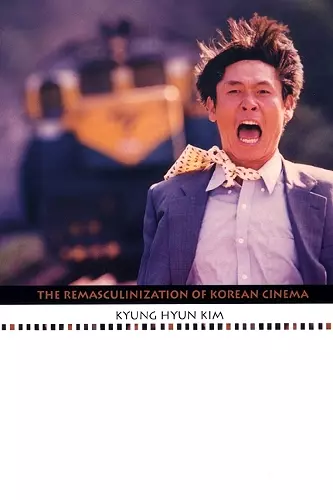The Remasculinization of Korean Cinema
Format:Hardback
Publisher:Duke University Press
Published:8th Mar '04
Currently unavailable, and unfortunately no date known when it will be back

Argues that although the last two decades of Korean history were a period of progress in political democratization, the country refused to part from a "masculine point of view" which is also mirrored in Korean cinema
In one of the first English-language studies of Korean cinema to date, Kyung Hyun Kim shows how the New Korean Cinema of the past quarter century has used the trope of masculinity to mirror the profound sociopolitical changes in the country. Since 1980, South Korea has transformed from an insular, authoritarian culture into a democratic and cosmopolitan society. The transition has fueled anxiety about male identity, and amid this tension, empowerment has been imagined as remasculinization. Kim argues that the brutality and violence ubiquitous in many Korean films is symptomatic of Korea’s on-going quest for modernity and a post-authoritarian identity.
Kim offers in-depth examinations of more than a dozen of the most representative films produced in Korea since 1980. In the process, he draws on the theories of Jacques Lacan, Slavoj Zizek, Gilles Deleuze, Rey Chow, and Kaja Silverman to follow the historical trajectory of screen representations of Korean men from self-loathing beings who desire to be controlled to subjects who are not only self-sufficient but also capable of destroying others. He discusses a range of movies from art-house films including To the Starry Island (1993) and The Day a Pig Fell into the Well (1996) to higher-grossing, popular films like Whale Hunting (1984) and Shiri (1999). He considers the work of several Korean auteurs—Park Kwang-su, Jang Sun-woo, and Hong Sang-su. Kim argues that Korean cinema must begin to imagine gender relations that defy the contradictions of sexual repression in order to move beyond such binary struggles as those between the traditional and the modern, or the traumatic and the post-traumatic.
“Kyung Hyun Kim’s book is a roller coaster ride through modern South Korean masculinity in the cinema. At once unflinching and sympathetic, Kim’s groundbreaking study traces Korean permutations on the gendered imagery of castration and rape and the impossible condition of postcolonial masculinity, caught between incommensurable values and demands.”—Chris Berry, coeditor of Mobile Cultures: New Media in Queer Asia
“This is an important book. There is a long tradition of scholarship investigating the representation of women in Asian cinema. This has included some consideration of Korean film, which more often than not finds the representations of Korean women wanting in one way or another. It took Kyung Hyun Kim’s writing to turn my attention to the rich complexity of the men. His focus on masculinity—coinciding with the turn to the issue by major feminist film theorists—simply makes perfect sense. His is a particularly compelling contribution to the study of Asian cinema, but is simultaneously in dialogue with all manner of gender studies.”—Abé Mark Nornes, University of Michigan
ISBN: 9780822332787
Dimensions: unknown
Weight: 662g
344 pages